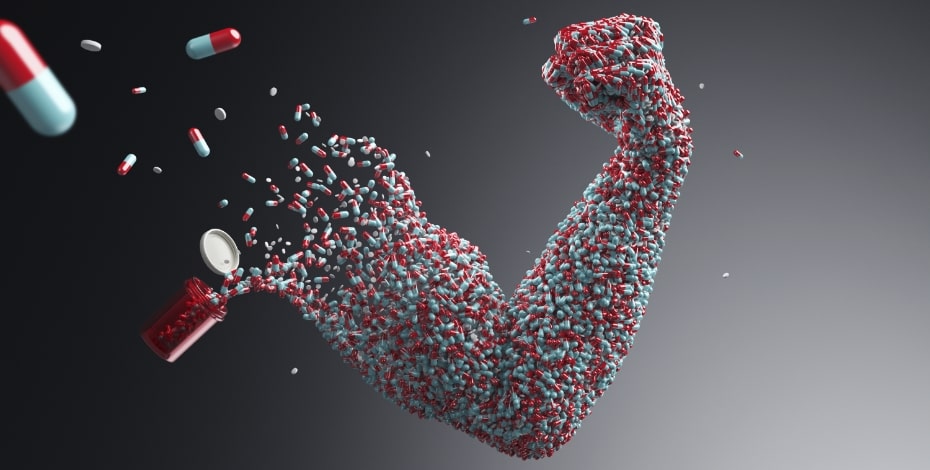
Muscling in on the supplement debate

Ankita Bhangui discusses research into the use of dietary supplements by athletes to maximise athletic performance and to aid in recovery after training or competition.
With an increasing value placed on competitive sport, demands on athletes to improve fitness and performance levels have also increased.
More emphasis is now being put on training and conditioning as the athlete strives to maximise physical capacity.
This push towards maximising athletic performance has led to a greater prevalence of sporting injuries, particularly related to overuse and overtraining.
To help reduce the risk of these injuries, there has been a growing interest in improving training protocols and an appreciation of the importance of recovery for athletes to help them return to peak capacity.
A range of recovery strategies have been promoted in the media and physiotherapists are often asked for their opinions on optimal recovery strategies.
Dietary supplements are a global multi-billion-dollar industry.
It is well recognised that appropriate nutrition plays an important role in maintaining good health in athletes and most athletes depend on supplements to help meet their nutritional demands, which will assist their performance.
However, athletes are increasingly using these supplements to hasten recovery after training or competition.
This review seeks to explore the scientific evidence for the effectiveness of the use of dietary supplements for facilitating recovery in athletes.
Methodology
Four online databases were searched in September 2020—MEDLINE, PubMed, Google Scholar and SPORTDiscus.
Articles were included if they involved healthy adults classified as professional, semi-professional or amateur athletes (training experience > two years) who did not consume performance-enhancing medications; examined the effects of dietary supplements on recovery outcomes; noted that supplementation was used before and/or immediately after match or training activity and throughout recovery; and were available in English.
Articles were excluded if they involved animals or non-athletes, if there was no clarity on supplementation, dietary or training protocol, if supplementation was only available in local markets due to limited availability or if the articles were not accessible in full text.
The Critical Appraisal Skills Program’s appraisal tools were used to assess the quality of the selected studies.
Results
One thousand and thirty-one articles were found and screened for relevancy, out of which 1022 articles were excluded—962 due to different outcomes, 28 due to different populations, 19 due to poor reporting, six because they were in a language other than English and seven because they were duplicates.
Nine studies fulfilled all the criteria.
They included one systematic review, which covered 10 studies and explored the use of protein-based supplementation (Poulios et al 2019), and eight randomised controlled trials that looked at the use of dietary supplements involving protein (Shenoy et al 2016, Hansen et al 2015, Larsen et al 2019), betalain-rich concentrate (Montenegro et al 2017), tart cherry juice extract (Abbott et al 2020), vitamin D (Mielgo-Ayuso et al 2018), green tea extract (Jówko et al 2015) and flavanol (Peschek et al 2014).
Discussion
The evidence for this review was of moderate to good quality.
The major issue with the included systematic review (Poulios et al 2019) was the limited search (one database only), while the included randomised controlled trials were limited by a focus on male subjects, with only five of the eight studies presenting sample size calculations.
The main outcomes for recovery in these studies can be grouped into three categories: muscle damage markers (creatine kinase, lactate dehydrogenase and myoglobin), inflammatory and oxidative stress markers, and muscle function measures.
Competitive sport imposes substantial energy and mechanical burdens on the athlete, which are reflected in a number of biochemical and haematological properties.
Most prominent is creatine kinase, which is believed to leak into the plasma from skeletal muscle fibres when they are damaged secondary to repeated and intense contractions (Mougios 2007).
The release of and elevation in myoglobin and lactate dehydrogenase are also used to indicate the presence of muscle damage or inflammation after exercise.
Endurance athletes, such as runners, cyclists, swimmers, and triathletes, require oxygen use in skeletal muscle to provide the energy for these sports.
The oxidative nature of their training may increase the production of free radicals, which are highly reactive, and antioxidant defences are necessary to protect cells from free radical damage.
This potential to damage cells is described as oxidative stress and may result in an inflammatory response from the immune system to protect host tissues.
A substantial body of evidence shows that high-intensity or prolonged-duration endurance training loads stimulate increased free radical production and oxidative stress.
Muscle function measures include muscle soreness according to the visual analogue scale, lower extremity function tests (such as vertical jump, running speed and sprint performance) and isometric torque productions measured using a dynamometer.
Four of the nine studies included the effects of protein supplementation on the recovery of athletes.

Ankita Bhangui considers research into the use of dietary supplements by athletes.
In their systematic review of the effect of protein-based supplementation on recovery in team sports, which included 10 studies (150 participants), Poulios et al (2019) concluded that protein-based supplementation appeared to diminish the rise in muscle damage markers in six of the studies and enhanced performance recovery in three of the studies.
These findings were supported in randomised controlled trials by Hansen et al (2015) and Shenoy et al (2016).
Hansen et al (2015), in their study of 18 elite orienteerers, found that ingestion of whey protein hydrolysate before and after exercise improved performance and reduced levels of muscle damage markers (creatine kinase, but not lactate dehydrogenase) over a strenuous one-week training period.
Shenoy et al (2016) used isolated soy protein supplementation in 40 men (20 boxers and 20 cyclists) aged 18–28 years and found a significant decrease in changes in high-sensitivity C-reactive protein, creatine kinase and myeloperoxidase with use of the supplement.
In these studies, which reported positive effects on the levels of muscle damage markers, the athletes consumed the protein-based supplementation before the physical activity.
Larsen et al (2019) had athletes ingesting whey protein isolate every night before sleep during a week of intensified endurance training and found no significant changes to the rise of muscle damage markers.
This suggests that the timing of protein supplement consumption plays an important role in recovery.
The other five studies looked at the effects of different interventions on recovery outcomes.
Mielgo-Ayuso et al (2018) concluded that vitamin D supplementation consisting of 3000 IU/day of vitamin D3 over eight weeks prevented a decline in haematological levels of haemoglobin and haematocrit in 36 elite male rowers but did not appear to affect testosterone or cortisol levels.
This study also saw maintenance of the optimal state of serum 25(OH)D in 50 per cent of the athletes in the intervention group. Serum 25(OH)D has been linked to athletic performance.
Betalains are a class of red and yellow tyrosine-derived pigments that form the majority of the pigment found in red beets and have been seen to show antioxidant and anti-inflammatory properties at rest.
Montenegro et al (2017) studied the effects of betalain-rich concentrate on exercise-induced inflammation and muscle damage in 29 triathletes and found that betalain supplements diminished the increase in creatine kinase levels and improved 10-kilometre and five-kilometre time trial running performance.
Green tea extract is considered a dietary supplement for recovery because tea catechins, polyphenols with flavonoid structure, have strong antioxidant properties.
In their study of 16 sprinters using green tea extract over a four-week period, Jówko et al (2015) found that green tea extract supplementation reduced oxidative stress markers, superoxide dismutase and malondialdehyde activity but not measures of muscle damage or sprint performance.
Available evidence indicated no effects of tart cherry juice (Abbott et al 2020) or dietary flavanols (Peschek et al 2014) on any of the recovery outcome parameters.
Implications for practice
In summary, there is limited, moderate to good quality data demonstrating the effectiveness of vitamin D, betalain concentrate and green tea extracts as supplements to aid recovery in athletes.
There appears to be consistent evidence supporting the use of protein supplementation for recovery purposes in athletes due to its effects on levels of muscle damage markers.
However, there is limited and inconsistent data to prove its effectiveness on inflammatory stress markers.
The protein needs to be consumed prior to exercise and not prior to sleep.
Vitamin D, betalain concentrates and green tea extract have also shown effects on muscle damage markers and oxidative stress markers but more evidence is needed to put these into practice.
>> Ankita Bhangui APAM is an avid sports enthusiast and practising physiotherapist with more than three years of clinical experience. Ankita is experienced in assessing and managing sports injuries. She is currently studying the Master of Advanced Clinical Physiotherapy (Sports) Program at the University of South Australia.
- References
-
1. Poulios, A., Georgakouli, K., Draganidis, D., Deli, C.K., Tsimeas, P.D., Chatzinikolaou, A., Papanikolaou, K., Batrakoulis, A., Mohr, M., Jamurtas, A.Z. and Fatouros, I.G., 2019. Protein-based supplementation to enhance recovery in team sports: What is the evidence?. Journal of Sports Science & Medicine, 18(3), p.523.
2. Montenegro, C.F., Kwong, D.A., Minow, Z.A., Davis, B.A., Lozada, C.F. and Casazza, G.A., 2017. Betalain-rich concentrate supplementation improves exercise performance and recovery in competitive triathletes. Applied Physiology, Nutrition, and Metabolism, 42(2), pp.166-172.
3. Abbott, W., Brashill, C., Brett, A. and Clifford, T., 2020. Tart Cherry Juice: No effect on muscle function loss or muscle soreness in professional soccer players after a match. International Journal of Sports Physiology and Performance, 15(2), pp.249-254.
4. Mielgo-Ayuso, J., Calleja-González, J., Urdampilleta, A., León-Guereño, P., Córdova, A., Caballero-García, A. and Fernandez-Lázaro, D., 2018. Effects of vitamin D supplementation on haematological values and muscle recovery in elite male traditional rowers. Nutrients, 10(12), p.1968.
5. Shenoy, S., Dhawan, M. and Sandhu, J.S., 2016. Four weeks of supplementation with isolated soy protein attenuates exercise-induced muscle damage and enhances muscle recovery in well trained athletes: a randomized trial. Asian journal of sports medicine, 7(3).
6. Hansen, M., Bangsbo, J., Jensen, J., Bibby, B.M. and Madsen, K., 2015. Effect of whey protein hydrolysate on performance and recovery of top-class orienteering runners. International Journal of Sport Nutrition and Exercise Metabolism, 25(2), pp.97-109.
7. Jówko, E., Długołęcka, B., Makaruk, B. and Cieśliński, I., 2015. The effect of green tea extract supplementation on exercise-induced oxidative stress parameters in male sprinters. European journal of nutrition, 54(5), pp.783-791.
8. Peschek, K., Pritchett, R., Bergman, E. and Pritchett, K., 2014. The effects of acute post exercise consumption of two cocoa-based beverages with varying flavanol content on indices of muscle recovery following downhill treadmill running. Nutrients, 6(1), pp.50-62.
9. Larsen, M.S., Clausen, D., Jørgensen, A.A., Mikkelsen, U.R. and Hansen, M., 2019. Presleep Protein Supplementation Does Not Improve Recovery During Consecutive Days of Intense Endurance Training: A Randomized Controlled Trial. International journal of sport nutrition and exercise metabolism, 29(4), pp.426-434.
10. Mougios V. (2007). Reference intervals for serum creatine kinase in athletes. British journal of sports medicine, 41(10), 674–678. https://doi.org/10.1136/bjsm.2006.034041 -
© Copyright 2024 by Australian Physiotherapy Association. All rights reserved.





